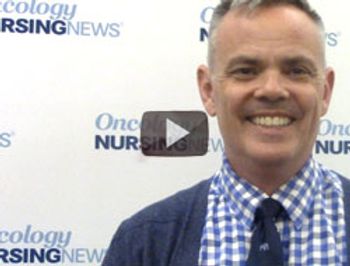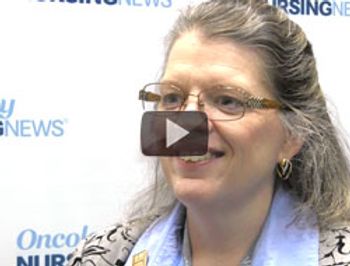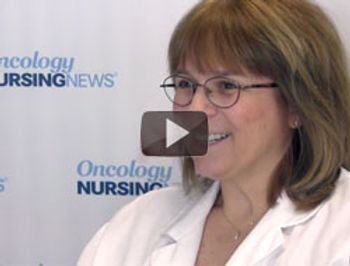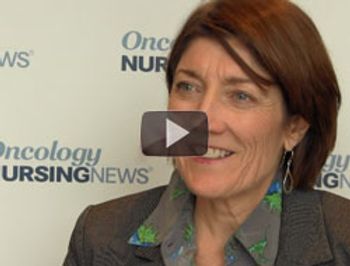
Kathrin Milbury, PhD, assistant professor of Integrative Medicine Research at The University of Texas MD Anderson Cancer Center, discusses spouse distress in couples coping with lung cancer.

Kathrin Milbury, PhD, assistant professor of Integrative Medicine Research at The University of Texas MD Anderson Cancer Center, discusses spouse distress in couples coping with lung cancer.

Mark Lazenby, PhD, APRN, FAPOS, associate professor at Yale School of Nursing and incoming president of American Psychosocial Oncology Society (APOS), discusses psychosocial topics that concern APOS.

Good nutrition is an important component in any patient's cancer journey. A healthy diet is needed to maintain appropriate body weight and strength, absorb the proper nutrients, keep body tissue healthy, and fight infection.

For patients with painful bone metastases, an intervention combining palliative care with radiation oncology led to better results, according to preliminary findings from a new study.

Nick Dionne-Odom, PhD, University of Alabama at Birmingham School of Nursing, discusses the impact of caregiver burden on patient survival.

The American Psychosocial Oncology Society (APOS) partnered with Yale School of Nursing to launch the Screening for Psychosocial Distress Program in 2014.

Mark Lazenby, PhD, associate professor at Yale School of Nursing and incoming president of American Psychosocial Oncology Society (APOS), discusses the Screening for Psychosocial Distress Program, which was launched in 2014 by APOS in partnership with Yale School of Nursing.

Dana Bushman, a certified yoga instructor, provides advice for a patient with cancer beginning yoga.

Dana Bushman, a certified yoga instructor, discusses the benefits of yoga for a patient, survivor or caregiver.

Mary B. Daly, MD, PhD, from Fox Chase Cancer Center, discusses the proper timing for screening patients with a family history of cancer.

ASCO updates clinical guideline screening among patients at high risk for HBV infection or HBV reactivation after chemotherapy.

Patricia Carter, PhD, RN, CNS, associate professor, School of Nursing, The University of Texas at Austin, discusses a study looking at insomnia and sleep disturbances in patients and caregivers.

Weight training was shown to help stave off deterioration of physical function in breast cancer survivors, conferring a benefit twice that of women in a control group who did not participate in the weight-lifting intervention.

Omega-3 may be harmful when taken in conjunction with chemotherapy.

With cancer treatment being delivered more in an outpatient setting, the burden of home healthcare has shifted more to family caregivers.

Newly reported findings from a randomized phase III vaccine efficacy trial demonstrate that HPV vaccination may offer protection against HPV-related cancers across multiple tumor sites in women aged 18-25 who had been previously exposed to the human papillomavirus, with the vaccine effective in more than half of these women.

A new study has shown that vaccinating adolescent boys may be cost-effective for preventing oropharyngeal cancer, a disease that's projected to become the most common HPV-related cancer by 2020.

Once a terminal illness, HIV is now considered a chronic disease due to the advances in highly active antiretroviral treatment (HAART).

Kim M. Hirshfield, MD, PhD, medical oncologist, Stacy Goldstein Breast Cancer Center, Rutgers Cancer Institute of New Jersey, discusses selecting individuals to screen for genetic mutations and the challenges of better selecting patients to screen.

A new study has shown that men with a high fitness level in midlife are not only at a lower risk of developing lung and colorectal cancer, they're also at a lower risk of dying from cancer if they're diagnosed later in life.

The continuing contentious debate about screening for prostate cancer remains top of mind among the public and lay press, but, Leonard G. Gomella, MD, told attendees at the 8th International Prostate Cancer Congress, the decision to screen or not to screen boiled down to "using common sense, shared decision making, and choosing the right patients to screen."

Margaretta Page, MS, RN, clinical nurse specialist, UCSF School of Medicine, discusses the importance of caring for the caregiver.

Screening for psychosocial distress is an important component of care, and has even been referred to as the "sixth vital sign."

When motivating people to get screened for cancer, fear may not be the best way to do it.

Few clinicians are asking about their use and most lack knowledge about them.

This NCI-funded educational program will train cancer care clinicians over two years to develop, implement, and maintain comprehensive psychosocial distress screening programs.

Erin W. Hofstatter, MD, assistant professor of medicine (medical oncology), co-director, Genetic Counseling Program, Yale Cancer Center, explains why it is important for breast cancer survivors to maintain a healthy lifestyle after their treatment

Debbie's Dream Foundation is hosting a free webinar on nutrition and clinical trials

Tara Sanft, MD, assistant professor of medicine (medical oncology), medical director, Adult Survivorship, Yale Cancer Center Survivorship Clinic, discusses the benefits of providing survivorship care to patients with cancer.

Two recent studies outline the importance of nutrition in preventing obesity-related cancers as well as the potential benefits of a nutrition education intervention in preventing breast cancer recurrence.